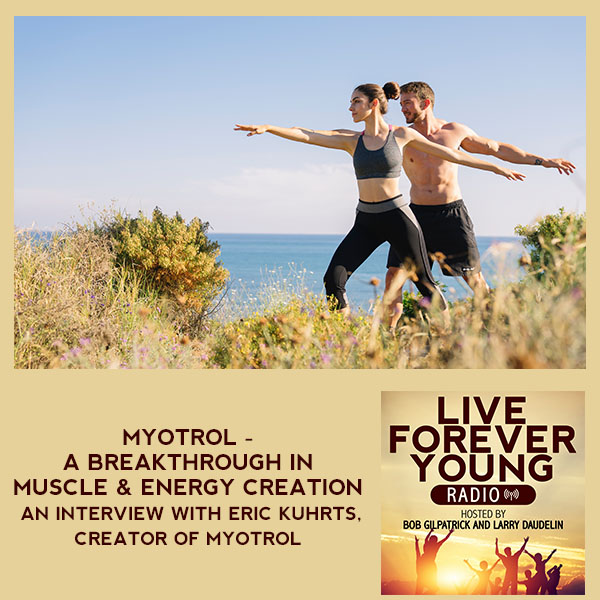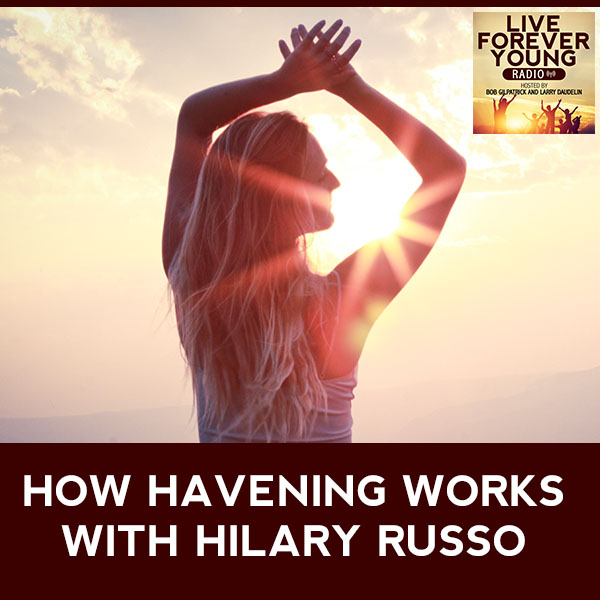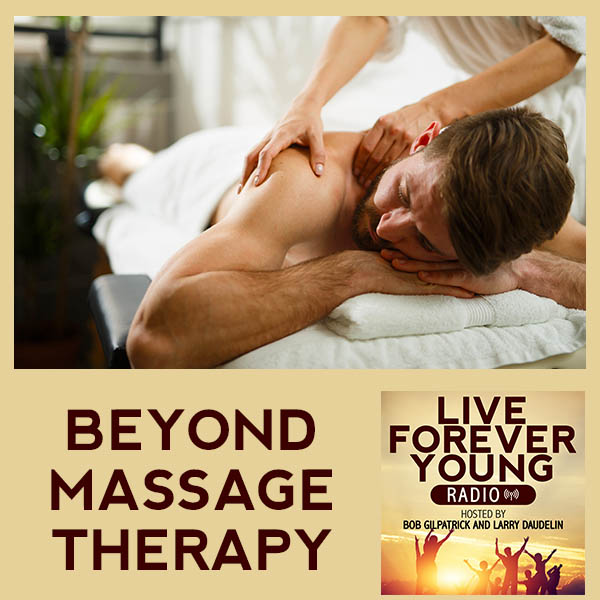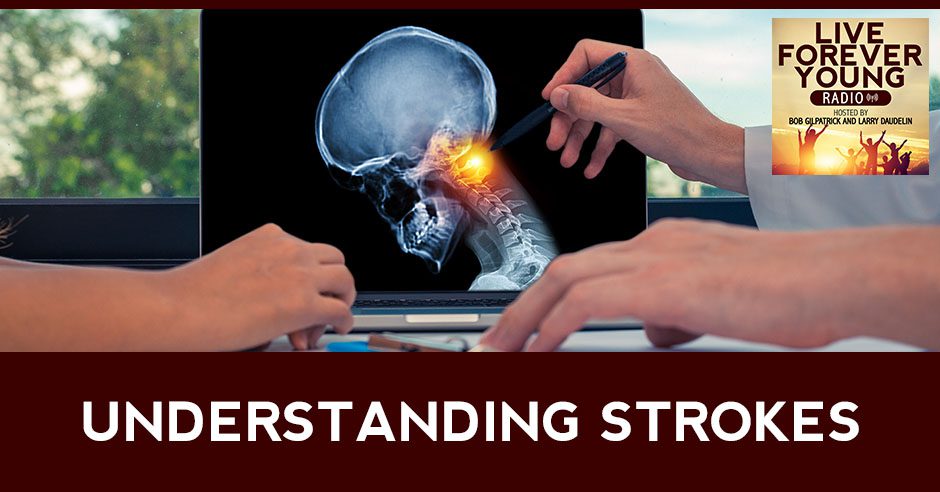
Did you know that every 4 minutes, someone dies of a stroke in the U.S.? This time on the show, Bob Gilpatrick and Rollie Culp guide you in understanding strokes by delving into the What’s and Whys of the disease. They identify the different kinds of strokes, what causes them, the most notable symptoms, and the impact they can have on your long-term health. They also share what you can do to help prevent a stroke and some strategies you can employ if you are recovering from one. From the most effective practices you can do at home to the right amount of food you must consume, they discuss the needed active response for this illness. So sit back, relax, and get ready to live forever young.
—
Watch the podcast here
Listen to the podcast here
Understanding Strokes
The What’s And Why’s Of Strokes
Did you know that every four minutes, someone dies of a stroke in the US? This time on the show, Bob and Rollie look at the whats and whys of strokes. They identify the different kinds of strokes, what causes them and the symptoms and impact they can have on your long-term health. They also share what you can do to help prevent a stroke and some strategies that you can employ if you are recovering from one. Sit back, relax and get ready to Live Forever Young.
—
Rollie, how are you?
I’m doing good. I’m feeling great.
We’re going to talk about strokes and the reason we are is it’s one of the leading causes of death. It’s also the leading cause of long-term disability.
You were sharing with me some numbers, but before we get into the numbers, basically, when you’re talking about a stroke, you’re talking about a lack or a loss in many cases of blood flow. A lot of the time, it’s to the brain. Obviously, we’ve got other things that can happen where blood doesn’t get through.
In the case of a stroke, there’s a temporary loss of blood flow to a section of the brain. It can either be ischemic. Meaning, there’s an actual blockage that’s blocked one of the arteries or capillaries or it can be a burst blood vessel. Almost 90% of the time, it’s an ischemic issue.
Which is a blockage, not a burst.
It’s a little blood clot that has formed and has made a blockage in an artery in the brain. This results in a wide range of problems, including death. Death immediately from the stroke can happen. In fact, in the United States, once every four minutes, someone dies from a stroke. Once every 40 seconds, someone has a stroke. It’s a very common thing to have to happen.

Understanding Strokes: In the United States, someone dies from a stroke once every 4 minutes or 40 seconds.
You were saying something like 800,000 a year.
Yes, 800,000 strokes per year happen in the United States.
You were talking about the little ones that are the clots. Those are also known as TIAs, is that right?
TIA is not a full-blown stroke. It’s a mini-stroke. The T is for transient. Meaning it happens quickly and dissipates and usually doesn’t leave by itself a long-term negative effect. If you have multiple TIAs and they occur over and over again, then it can. Quite often, people that have dementia, similar to Alzheimer’s disease. People can get what mimics Alzheimer’s disease from having multiple TIA, Transient Ischemic Attacks. That’s a big cause of dementia. If people have a lot of these mini-strokes, eventually they demonstrate signs of dementia, forgetfulness, unable to focus and remember things. It’s like if someone’s getting Alzheimer’s disease.
I’ve heard a lot of the people who have TIAs, a lot of times, they don’t even realize they happen.
No, it could be very slight where it happens for a second or it can be more like where someone would stumble and fall and maybe pass out but very quickly, they recover. Whereas a more severe stroke is going to possibly result in death. It can result in more serious long-term disabilities. People can get paralyzed on one side of their bodies. They can lose their ability to speak. They can have a collapsing of their facial muscles and things like that. Many times, people are unable to return to work or care for themselves fully and they’re dependent on other people. This is a cost to society of almost $50 billion a year.
The care for people who have strokes costs about 50 billion a year.
Also, the lost work and all that.
The loss of employees, I didn’t even think about that.
The single most important thing to do after having a stroke is to reduce your inflammation. Share on XWhat causes this, which is important to understand is, a number of different things. One is having high blood pressure. A lot of people do have high blood pressure and they don’t even know it because they never go to their doctor. Also, being overweight or obese and having diabetes is a very big contributor to it. Also, excessive drinking of alcoholic beverages and also, poor sleep is a big contributor.
More and more now, the studies are showing that stress, whether it is acute sentinel events, death in the family, that type of thing or it can be long-term stress over time or a combination of both. In order for society to avoid all this death and disability or for an individual to say, “I don’t want that to happen to me.” We need to know some things about how to prevent having a stroke.
We talk about almost everything. The inflammation is huge. The more inflammation you have, the worst problems are going to be with almost everything. In this case, the inflammation causes a lot of issues with circulation because you have all that extra inflammation.
Because of the inflammation on the inside of your arteries and the lining of the arteries, this gives rise to plaque that can break off and cause a stroke. Probably the single most important thing you can do is to reduce your inflammation. If you look back at what’s causing the inflammation, number one is your diet. People that consume too much sugar and have high blood sugar, whether it’s pre-diabetes or diabetes, either type 1 or type 2, are going to cause a lot of inflammation.
The excess sugar that’s in your bloodstream doesn’t sit there and flow around your body. It bumps up against proteins that are in your blood, which are very valuable proteins. When the sugar bumps up against them, it glycates them and renders them into toxins as opposed to useful proteins. It throws off a molecule of superoxide, which is a very volatile, free radical that causes tremendous damage to your body. Watching your blood sugar is the most important thing to do.

Understanding Strokes: People with a smaller amygdala are usually under constant stress. As a result, they’re prone to anger outbursts and high inflammation.
You got to say on top of the additional sugar. The creation of the free radicals causes more and more inflammation. That’s why it’s important to obviously be careful what you eat as far as inflammatory foods as well. We talked a lot about on other shows, processed foods and things like that. Those are full of things that can cause inflammation and only make the problem worse.
It’s like what we were talking about the causes of strokes. Stress is another thing. That’s the main cause of what they were finding. Stress is a major cause, especially nowadays with everything that’s going on in society. We got to time that stress and we could use things like tapping, as we’ve talked about before and head circles, which you can find videos on Boomers Forever Young YouTube.
The Ultimate Mind Calming Exercise (Head Circles) is very important. With stress, what’s happening is and this is where they’ve done detailed research is the communication between your heart and your brain. They’ve done lots of studies with animals where they’ve purposely blocked off certain communication avenues and watched and saw what happened with strokes and inflammation.
In particular, there’s a section of your brain called the amygdala, which is the seat of your brain that decides if you need to be under stress or not. It decides if everything is okay or not okay and you have brain chemistry. The chemistry all throughout your body, especially in your heart that is going to create inflammation that can lead to all different types of diseases. Knowing how to signal your amygdala so that it’s not creating this cascade of problems is very important. We know from one of the shows that we did on finding your inner balance.
I believe it’s called How to Achieve Inner Balance.
That show could be the most important one related to preventing strokes, along with information about keeping your inflammation down. If you want to see more, go back, read the show on inflammation and read the one on inner balance. These would be the two things that will bring you along most quickly in building a posture for yourself that can help prevent strokes. The inner balance is very important.
Stress is one of the main causes of stroke, especially nowadays with everything going on in society. Share on XThere’s a device called Inner Balance that you can use and clip onto your ear. It gives you feedback on what’s happening with your heart, which is very important because your heart is signaling your amygdala. Letting the amygdala know everything is okay or not okay, your amygdala then signals your frontal cortex, which signals your heart. In some of the research with rats, they were blocking the communication between the amygdala and the frontal cortex. When that got blocked, the frontal cortex couldn’t signal the heart.
If you block the communication anywhere along the way, you create tremendous stress but in humans, it’s easy now focusing on your inner balance and learning how to focus on gratitude. Also, learning relaxation techniques to calm your mind and the whole idea of an inner balance device and other stress management techniques will go a long way towards reducing your inflammation and reducing your risk for a stroke.
One of the things that we were looking, using and showing people on that video How to Achieve Inner Balance is you having this thing called coherence, which is what you’re trying to focus your mind on this thing within coherence and focus your breathing. That alone, focusing on breathing, can help. That’s why we have the head circles. There are plenty of tools that you can find, especially in our show and on our YouTube channel, that can help to reduce stress. As we’ve said, you could take all the best nutritional supplements in the world, but if you’re still stressed, you’re going to be sick.
In this case, understanding that heart, brain connection is extremely important. They’ve gone as far. Rollie is doing studies that show the actual size of different parts of the amygdala in people. For people that are under long-term stress, there’s a section of the amygdala that deteriorates. People will have a smaller amygdala if they’ve been under constant stress. They’re prone to anger outbursts and they’re prone to high inflammation. This is very important stuff.
That’s crazy when you think about your connection between the amygdala and the heart, which again, we’ve talked about a lot. One of the things I was thinking about is how we prevent having a stroke. if you’ve had a stroke though, what are some of the things that you could do to recover?

Understanding Strokes: You need to reduce your overall inflammation because your ability to recover from a stroke is highly dependent on how inflamed your brain is.
A lot of people will go through rehab. Rehab is a very important part of it where you will work with a therapist to learn to regain your speech, to learn to regain the functionality of your limbs and that type of thing. You also need to reduce your overall inflammation because your ability to recover from a stroke is highly dependent on how inflamed your brain is. You need to endeavor to reduce the inflammation in your brain in order to recover fully and quickly from a stroke.
This is where people have to know which things you can consume, which are the compounds that are going to reduce homocysteine, which is trimethylglycine. Also, to be able to have superoxide dismutase, glutathione and vitamins, the ACE vitamins, A, C and E, selenium, zinc and grape skin extract. These types of compounds are going to reduce that inflammation in your brain without any question.
They’re also doing research now on using very mild electric stem from exogenous stem into people’s brains that reduce inflammation. It’s a very important thing both for stroke and recovery from the head injury itself. These head injuries and strokes have some similarities. For both of those conditions, you need to reduce inflammation. We’re lucky here that you and I can take our Sprouted Barley Seeds and Boomer Boost and things like Ashwagandha and Turmeric. All of which reduce your inflammation, but in particular, fatty acids like fish oil can help reduce inflammation in the brain quite a bit.
It’s great for brain health. One of the best things for your brain is the Omega-3 and eating very good fats like avocados and you got your fish and anything like that.
There’s a story about a very famous health consultant whose son had a severe brain injury. She was able to intervene as a nutritionist and give him very large amounts of omega-3 fatty acids. After it looked like he wasn’t going to recover anymore, they started this regime and he ended up making a full recovery.
Just by adding a lot of omega-3s.
You could take all the best nutritional supplements in the world, but if you're still stressed, you will be sick. Share on XAlso, to be able to increase your circulation to the brain is very important. People can increase their circulation in a number of different ways. We have a whole show on circulation, including the use of pulsed electromagnetic fields, which can come in the form of a mat that you can lie on. There’s a power supply that helps to increase your circulation.
One of the things that we talked about, too, is that obviously, if you’re having to rebuild your body, you need stem cells. We had a show we did with Ann Harrison called Stem Cells Need Nutrition Too!. It talks not only about how you have to create healthy stem cells and to have the right nutrients and vitamins and minerals, which if you’re not eating healthy, then you’re not going to make healthy stem cells.
That’s why you want to have all those vitamins we were talking about, the ACE vitamins, micro and macronutrients, which Boomer Boost provides. The ability to circulate the stem cells because if you make stem cells, that’s great but you can’t circulate them to where they need to go so they can morph to whatever it is. If you’re recovering from a stroke, you might need whatever. If they can’t get to the brain or they can’t get to where they need to go, they’re not going to do any good.
You need to have both neurogenesis and neuroplasticity to recover from a stroke because you need to grow some new brain cells to replace ones that have been damaged. You also need to rewire your brain. Your brain is capable of morphing and changing and making new pathways to help overcome the damaged pathways. It’s neuroplasticity and it needs substrates to be able to formulate that.
You have to make the new connections or established the old ones because you’re now having to repair them. We were talking about this a little bit in a show we did call Achieving Limitless Brain Power, where we also talk about nootropics. The nootropics can help increase oxygen and nutrient delivery as well, which again, you need the oxygen and the nutrients to repair. You got to have good circulation. If you can do that, you can take a supplement that helps that as well and that will hopefully increase your ability to recover.
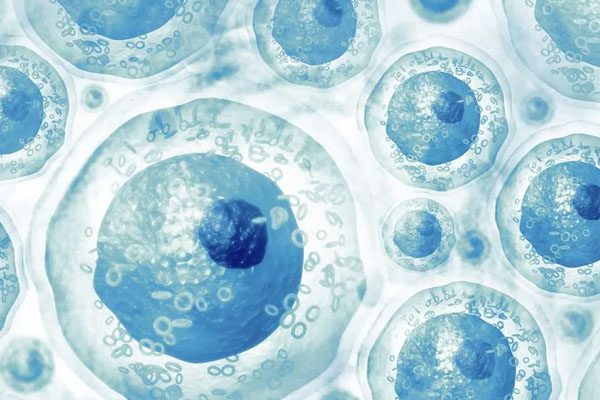
Understanding Strokes: If you cannot circulate stem cells properly to reach where they should go in your body, it won’t do you any good.
Rollie, people can give us a call at our office because this is a lot of information. Maybe people have special questions. If they’d like to call us, we can walk them through it and say, “What have you done so far? Maybe there’s this too, that you have forgotten or know about.”
Our number is 1-800-861-4609. You can also email us. If you have a question or maybe you wanted to hear something different or a different topic, you can email us at BoomerBoost@BoomerBoosts.com. We’ll get that. If you have a suggestion or maybe have another question or anything, we’d be happy to answer that.
Rollie, I think that’s about it for this episode.
We went over a lot of stuff for strokes.
We went fast.
It did seem so quick.
People can go back and reread. I would highly encourage you go back and read the other episodes again, particularly on information in managing stress and anxiety. I want to say thanks, Rollie. Thank you everybody for reading. We’ll see you on the next show.
Important Links:
- Boomers Forever Young – YouTube
- The Ultimate Mind Calming Exercise (Head Circles) – YouTube
- How to Achieve Inner Balance – Previous episode
- Inner Balance
- Boomer Boost
- Ashwagandha
- Turmeric
- Stem Cells Need Nutrition Too! – Previous episode
- Achieving Limitless Brain Power – Previous episode
- BoomerBoost@BoomerBoosts.com




